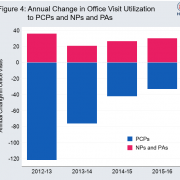Care Team
As primary care shifts from transactional to quality focused, incorporating a care team has become even more beneficial. In order to provide comprehensive, patient-centered care, more than just the clinician must play a role. The care team consists of physicians, nurse practitioners, PAs, nurses, care managers, dieticians, and social workers, among others. Having a large, well-coordinated team allows patients to avoid the confusion when attempting to access primary care services and leads to better connectedness in their care. The care team is totally devoted to ensuring that the patient is at the center of the care process. As the driver of the care team, the patient is especially involved in choosing their course of care. Care teams are essential in coordination, and continuity of care. As clinics develop a care team, it is critical that they include the patient voice, to ensure that they are effectively meeting the patients' needs. If the care team lacks cohesion, it will only further contribute to the current, fragmented system.
Resources

Journal of the American Academy of Pediatrics | May 2014
The New England Journal of Medicine | April 2014

The Commonwealth Fund | April 2014

John A. Hartford Foundation | April 2014

Journal of Public Health Management and Practice | March 2014

American Journal of Managed Care | March 2014
- ‹ previous
- 10 of 19
- next ›
News
November 14, 2018 | Modern Healthcare
November 10, 2018 | Modern Healthcare
- ‹ previous
- 10 of 64
- next ›
Events & Media
March 27, 2018
October 21, 2018
- ‹ previous
- 10 of 49
- next ›
Related Content
Pages
| Title | Source | Date |
|---|---|---|
| Trying to Put a Value on the Doctor-Patient Relationship | New York Times | May 16, 2018 |
| Maryland announces agreement on all-payer health model | Washington Post | May 14, 2018 |
| Beyond Health Care: The Role of Social Determinants in Promoting Health and Health Equity | May 10, 2018 | |
| Opportunities for Risk-Taking Primary Care Providers | NEJM Catalyst | May 10, 2018 |
| Virtual doctor visits are getting more popular, but questions remain about who pays | May 6, 2018 | |
| A Framework for the Design of Effective Primary Care Systems | May 4, 2018 | |
| The Patient-Centered Medical Home is Not Always the Primary Care Provider’s Office | May 4, 2018 | |
| Is Direct Primary Care a Game Changer? | JAMA Network | May 2, 2018 |
| Telemedicine Opening Doors To Specialty Care For Inmates | Kaiser Health News | May 1, 2018 |
| Demystifying and strengthening integrated care | National Association of Primary Care | April 30, 2018 |
Pages
Associated Stakeholders:
Secondary menu
Copyright © 2024 Primary Care Collaborative














